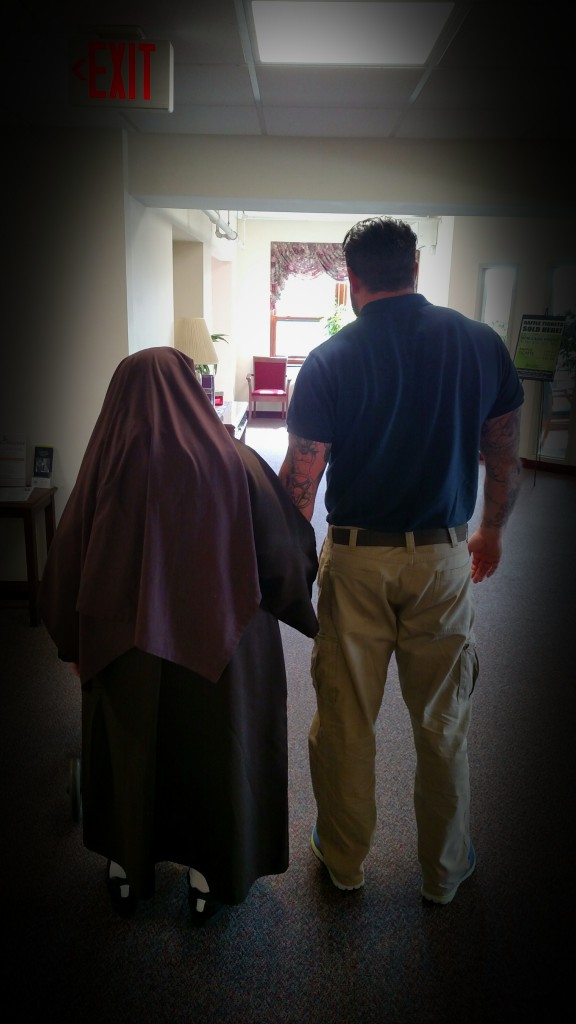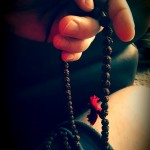I hear her cackle first thing in the morning.
I come in at 6:30 am and she has been up for three hours already, two of which are spent praying in the chapel downstairs. I sit down at my desk and hear her laughing—cackling if you will—with the nurses. She is almost 80 and yet, when she laughs you can hear that tinge of mischief in her voice.
I can hear her shuffle as she makes her way down the hall. When she is about 20 feet away and knows she is near, she calls out, “Ty, are you up there today?” “No,” I reply. She laughs and I laugh. She reaches my desk and tells me she has a treat for me. Digging around in her bag, seeing nothing but feeling everything, she pulls out an oatmeal raison cookie that I greedily devour with my morning coffee.
She turns her walker around and sits down on its built-in seat. We begin to chat, our weekend ritual, and she tells me almost immediately how lonely she is. “I always ask people to come visit. They say they will, and yet, they never show up.” Her eyes, sightless, remain unaffected, yet I see the sadness in her face. ‘Well,” I interject, “I love our conversations and you can come and chat with me anytime you want to!”
I see her soft and wrinkled face light up with a smile.
As we continue to talk, we touch upon how lonely and quiet much of the contemplative life and tradition is. While we accept this loneliness (and Trungpa also noted the need for loneliness) we also touch on the need for fellowship and being around people who understand that not every silence needs to be filled with meaningless words. It is often just being around someone—comfortable in the silence, sharing only words of depth and compassion—which have the largest impact on us emotionally.
I tell her how loud and crazy it gets here, in my position. The constant tug at my attention, the need for help, the ringing phones, the directing of staff and nurses to needed areas and the 13 hour shift with little and sometimes no break.
“I walk down to the first floor hallway and pace in the darkness,” I tell her. “It is so quiet and I am able to do my walking meditation—just my steps, my breath and my mala.” I see the question on her face before she even asks, so I explain, “A mala is like a rosary for Buddhists.” She nods.
She comments on how she rarely gets that type of silent fellowship here. The noise and hustle and bustle are constant. I suggest, “Would you like to join me, sister? I know you can’t follow me around but we can sit in a pew together in the chapel while it is empty, you can pray and I can chant.” I find myself uttering words that seem so foreign and at the same time, so healing.
Her face breaks into a smile that cannot be fully explained in words. It is bright, warm and childlike in its happiness. “I would love that,” she answers. “Oh, that would be so wonderful!” I can see the delight and the rest that touches her face as the connection between aspirants is made. The loneliness is lightened. I feel my heart lift and feel my cheeks aching from smiling so hard.
We must be an odd pair, the blind nun and the tattooed Buddhist.
We walk down the hall, side by side—she stooped, frail, slow, and me tall, heavily muscled and covered in tattoos from a life past. We walk silently and enter the chapel. The regal ceilings and stained glass are cause for pause. I direct her to a pew, she slides in and kneels down, her rosary wrapped around her tiny hands. I remove my shoes and find a comfortable cross legged position near her, my mala wrapped around mine.
I see her lips moving in silent prayer as I close my eyes and settle into my breath. The Catholic nun and the tattooed Buddhist—we sit, we fellowship, we breathe together. That is all that matters in these moments. Nothing more.
As we finish, I direct her out and she holds my hand for the briefest moment. She squeezes my hand and says, “Thank you.” I look and see a tear on her cheek but a smile on her face. “I haven’t felt closer to my faith in a long time, and it’s a feeling of hope that you have given me.” I don’t know how to respond. Oddly, I know exactly how she feels.
I feel closer to my own tradition, to her, to everyone around me and all for those 30 silent minutes with an old, blind nun.











